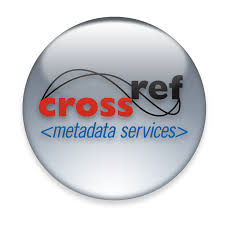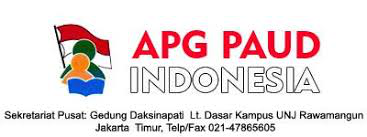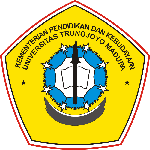- Focus and Scope
- Section Policies
- Peer Review Process
- Publication Frequency
- Open Access Policy
- Archiving
- Publication Ethics
- Publication Charges
- Withdrawal Manuscript
- Abstracting and Indexing
- Plagiarism Checker
Focus and Scope
Jurnal PG-PAUD Trunojoyo: Jurnal Pendidikan dan Pembelajaran Anak Usia Dini is a professional publication of original peer-reviewed articles that reflect exemplary practices in the field of contemporary early childhood education. Articles cover the social, physical, emotional, and intellectual development of children age birth through 8, analyzing issues, trends, and practices from an educational perspective. Jurnal PG-PAUD Trunojoyo: Jurnal Pendidikan dan Pembelajaran Anak Usia Dini is of interest not only to classroom teachers, child care providers, college and university faculty, and administrators, but also to other professionals in psychology, health care, family relations, and social services dedicated to the care of young children.
Areas of Emphasis:
Educational programs in diverse settings;
Early learning across multiple domains;
Projects demonstrating inter-professional collaboration;
Qualitative and quantitative research and case studies;
Best practices in early childhood teacher education;
Theory, research, and practice relating to professional development;
Family, school, and community relationships;
Investigations related to curriculum and instruction;
Articles that link theory and best practices;
Indigenous culture in the children context.
Section Policies
Artikel
Peer Review Process
All submitted manuscripts are read by the editorial staff. The review proccess uses double blind review system. Those manuscripts submitted to this online journal will be peer-reviewed at least 2 (two) reviewers. The accepted manuscripts will be available online following the journal double blind peer-reviewing process. Language used in this journal is English or Indonesia.
Double blind peer review proccess is designed to assess the validity, quality and often the originality of articles for publication. Its ultimate purpose is to maintain the integrity of science by filtering out invalid or poor quality articles.
Those manuscripts evaluated by editors to be inappropriate to journal criteria are rejected promptly without external review. Manuscripts evaluated to be of potential interest to our readership are sent to reviewers. From a publisher’s perspective, peer review functions as a filter for content, directing better quality articles to better quality journals and so creating journal brands. The editors then make a decision based on the reviewer’s recommendation from among several possibilities: rejected, require major revision, need minor revision, or accepted. Running articles through the process of peer review adds value to them. For this reason publishers need to make sure that peer review is robust. The typical period of time allowed for reviews in 4 weeks.
Publication Frequency
This journal is published biannually in April and October each year.
Open Access Policy
This journal provides immediate open access to its content on the principle that making research freely available to the public supports a greater global exchange of knowledge.
This journal is open access journal which means that all content is freely available without charge to users or / institution. Users are allowed to read, download, copy, distribute, print, search, or link to full text articles in this journal without asking prior permission from the publisher or author.
Archiving
This journal utilizes the LOCKSS system to create a distributed archiving system among participating libraries and permits those libraries to create permanent archives of the journal for purposes of preservation and restoration. More...
Publication Ethics
Jurnal-PG PAUD Trunojoyo : Jurnal Pendidikan dan Pembelajaran Anak Usia Dini is a peer-reviewed journal online and published bi-annually on April and October by Departement of Early Childhood Teacher Education, Faculty of Education, Universitas Trunojoyo Madura. This statement clarifies the ethical behavior of all parties involved in the act of publishing an article in this journal, including the author, the chief editor, the Editorial Board, the peer-reviewer and the publisher. This statement is based on COPE’s Best Practice Guidelines for Journal Editors.
Ethical Guideline for Journal Publication
The publication of an article in a peer-reviewed Jurnal PG-PAUD Trunojoyo : Jurnal Pendidikan dan Pembelajaran Anak Usia Dini is an essential building block in the development of a coherent and respected network of knowledge. It is a direct reflection of the quality of the work of the authors and the institutions that support them. Peer-reviewed articles support and embody the scientific method. It is therefore important to agree upon standards of expected ethical behavior for all parties involved in the act of publishing: the author, the journal editor, the peer reviewer, the publisher and the society.
Departement of Early Childhood Teacher Education, Faculty of Education, Universitas Trunojoyo Madura as publisher of Jurnal PG-PAUD Trunojoyo : Jurnal Pendidikan dan Pembelajaran Anak Usia Dini takes its duties of guardianship over all stages of publishing seriously and we recognize our ethical and other responsibilities. We are committed to ensuring that advertising, reprint or other commercial revenue has no impact or influence on editorial decisions.
Publication decisions
The editor of the Jurnal PG-PAUD Trunojoyo : Jurnal Pendidikan dan Pembelajaran Anak Usia Dini is responsible for deciding which of the articles submitted to the journal should be published. The validation of the work in question and its importance to researchers and readers must always drive such decisions. The editors may be guided by the policies of the journal's editorial board and constrained by such legal requirements as shall then be in force regarding libel, copyright infringement and plagiarism.
Fair play
An editor at any time evaluates manuscripts for their intellectual content without regard to race, gender, sexual orientation, religious belief, ethnic origin, citizenship, or political philosophy of the authors.
Confidentiality
The editorial board must not disclose any information about a submitted manuscript to anyone other than the corresponding author, reviewers, other editorial advisers, and the publisher, as appropriate.
Disclosure and conflicts of interest
Unpublished materials disclosed in a submitted manuscript must not be used in an editor's own research without the express written consent of the author.
Duties of Reviewers
Contribution to Editorial Decisions
Peer review assists the editor in making editorial decisions and through the editorial communications with the author may also assist the author in improving the paper.
Promptness
Any selected referee who feels unqualified to review the research reported in a manuscript or knows that its prompt review will be impossible should notify the editor and excuse himself from the review process.
Confidentiality
Any manuscripts received for review must be treated as confidential documents. They must not be shown to or discussed with others except as authorized by the editor.
Standards of Objectivity
Reviews should be conducted objectively. Personal criticism of the author is inappropriate. Referees should express their views clearly with supporting arguments.
Acknowledgement of Sources
Reviewers should identify relevant published work that has not been cited by the authors. Any statement that an observation, derivation, or argument had been previously reported should be accompanied by the relevant citation. A reviewer should also call to the editor's attention any substantial similarity or overlap between the manuscript under consideration and any other published paper of which they have personal knowledge.
Disclosure and Conflict of Interest
Privileged information or ideas obtained through peer review must be kept confidential and not used for personal advantage. Reviewers should not consider manuscripts in which they have conflicts of interest resulting from competitive, collaborative, or other relationships or connections with any of the authors, companies, or institutions connected to the papers.
Duties of Authors
Reporting standards
Authors of reports of original research should present an accurate account of the work performed as well as an objective discussion of its significance. Underlying data should be represented accurately in the paper. A paper should contain sufficient detail and references to permit others to replicate the work. Fraudulent or knowingly inaccurate statements constitute unethical behavior and are unacceptable.
Originality and Plagiarism
The authors should ensure that they have written entirely original works, and if the authors have used the work and/or words of others that this has been appropriately cited or quoted. Plagiarism takes many forms, from passing off another’s paper as the author’s own paper to copying or paraphrasing substantial parts of another’s paper (without attribution), to claiming results from research conducted by others. Plagiarism in all its forms constitutes unethical publishing behavior and is unacceptable.
Multiple, Redundant or Concurrent Publication
An author should not, in general, publish manuscripts describing essentially the same research in more than one journal or primary publication. Submitting the same manuscript to more than one journal concurrently constitutes unethical publishing behavior and is unacceptable.
Acknowledgement of Sources
Proper acknowledgment of the work of others must always be given. Authors should cite publications that have been influential in determining the nature of the reported work.
Authorship of the Paper
Authorship should be limited to those who have made a significant contribution to the conception, design, execution, or interpretation of the reported study. All those who have made significant contributions should be listed as co-authors. Where there are others who have participated in certain substantive aspects of the research project, they should be acknowledged or listed as contributors. The corresponding author should ensure that all appropriate co-authors and no inappropriate co-authors are included on the paper and that all co-authors have seen and approved the final version of the paper and have agreed to its submission for publication.
Disclosure and Conflicts of Interest
All authors should disclose in their manuscript any financial or other substantive conflicts of interest that might be construed to influence the results or interpretation of their manuscript. All sources of financial support for the project should be disclosed.
Fundamental errors in published works
When an author discovers a significant error or inaccuracy in his/her own published work, it is the author’s obligation to promptly notify the journal editor or publisher and cooperate with the editor to retract or correct the paper.
Publication Charges
Jurnal PG-PAUD Trunojoyo: Jurnal Pendidikan dan Pembelajaran Anak Usia Dini does not charge for submission and any processing or publishing fees for every regular articles published before April 2021. For special issue articles and published after April 2024 so on, IDR 600.000 charges will apply (does not include translation and proofreading fees).
Withdrawal Manuscript
The author is not allowed to withdraw submitted manuscripts because the withdrawal is waste of valuable resources that editors and referees spent a great deal of time processing submitted the manuscript, money, and works invested by the publisher. If author still requests withdrawal of his/her manuscript when the manuscript is still in the peer-reviewing process, the author will be punished.
Abstracting and Indexing
Jurnal PG PAUD Trunojoyo : Jurnal Pendidikan dan Pembelajaran Anak Usia Dini has been indexed by:
Plagiarism Checker
Editorial board recognizes that plagiarism is not acceptable and therefore establishes the following policy stating specific actions (penalties) upon identification of plagiarism/similarities in articles submitted for publication in Jurnal PG-PAUD Trunojoyo. We will use Turnitin's originality checking software as the tool in detecting similarities of texts in article manuscripts and the final version articles ready for publication. A maximum of 20% of similarities is allowed for the submitted papers. Should we find more than 20% of the similarity index, the article will be returned to the author for correction and resubmission.











